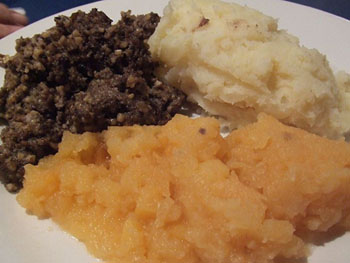Address to a Haggis
"Address to a Haggis" is a poem written by Robert Burns (1759 - 1796). Burns is one of Scotland's most beloved poets.
Haggis is a Scottish dish containing minced sheep's heart, liver and lungs, onion, oatmeal, suet, spices, salt and stock, all mixed together. Then traditionally it's all simmered in the animal's stomach for three hours.
"Address to a Haggis" is read out loud every year on Robert Burns Day, which is celebrated in Scotland and Northern Ireland every year around Burn's birthday on January 25th. Many people have a Burns' Supper in celebration of the poet's birth.
Xavec wrote from Scotland about this celebration:
"Burns' night on the 25th is celebrated by many, to celebrate the Scottish poet Robert ('Rabbie') Burns. Restaurants and pubs will (if they don't already) serve up a traditional 'Burns Supper' of haggis, neeps (mashed turnips) and tatties (mashed potato). It is accompanied by a dram (small measure) of neat whiskey. Done properly, the Selkirk Grace is recited beforehand, and the haggis is carried into the room to the accompaniment of the bagpipes. Then, the most crucial part, 'address to the haggis' happens. This is literally a recitation of Burns' 8 verse poem about the wonder of haggis *to* the haggis, and culminates with it's consumption by everyone in the room. throughout the meal there will be formal toasts and speeches, including the 'Toast to the lassies' and 'Toast to the laddies', both of which should be playfull observations of one sex on the other."
Address to a Haggis
Address to a Haggis
Burns Supper Poem
Burns Supper Poem
(Scots)
(English)
Fair fa' your honest, sonsie face,
Great chieftain o' the puddin-race!
Aboon them a' ye tak your place,
Painch, tripe, or thairm:
Weel are ye wordy o' a grace
As lang's my arm.
The groaning trencher there ye fill,
Your hurdies like a distant hill,
Your pin wad help to mend a mill
In time o' need,
While thro' your pores the dews distil
Like amber bead.
His knife see rustic Labour dicht,
An' cut you up wi' ready slicht,
Trenching your gushing entrails bricht,
Like ony ditch;
And then, O what a glorious sicht,
Warm-reekin, rich!
Then, horn for horn, they stretch an' strive:
Deil tak the hindmaist! on they drive,
Till a' their weel-swall'd kytes belyve,
Are bent like drums;
Then auld Guidman, maist like to rive,
"Bethankit" hums.
Is there that o're his French ragout
Or olio that wad staw a sow,
Or fricassee wad mak her spew
Wi' perfect scunner,
Looks down wi' sneering, scornfu' view
On sic a dinner?
Poor devil! see him ower his trash,
As feckless as a wither'd rash,
His spindle shank, a guid whip-lash,
His nieve a nit;
Thro' bloody flood or field to dash,
O how unfit!
But mark the Rustic, haggis fed,
The trembling earth resounds his tread.
Clap in his wallie nieve a blade,
He'll mak it whistle;
An' legs an' arms, an' heads will sned,
Like taps o' thristle.
Ye Pow'rs wha mak mankind your care,
And dish them out their bill o' fare,
Auld Scotland wants nae skinkin ware
That jaups in luggies;
But, if ye wish her gratefu' prayer,
Gie her a haggis!
Fair full your honest, cheerful face,
Great chieftain of the meat-pudding race!
Above them all you take your place,
Stomach, tripe, or intestines:
Well are you worthy of a grace
As long as my arm.
The groaning deep dish there you fill,
Your buttocks like a distant hill,
Your pin would help to mend a mill
In time of need,
While through your pores the dews distill
Like amber bead.
His knife, see rustic labor sharpen
And cut you up with ready skill,
Trenching your gushing entrails bright,
Like any ditch;
And then, O what a glorious sight,
Warm steaming, rich!
Then, spoon for spoon, they stretch and strive:
Devil take the hindmost! on they drive,
Till all their well-swollen bellies soon,
Are bent like drums;
Then the man of the house, most like to burst,
"God be thanked" hums.
Is there one that over his French ragout
Or stew that would sicken a sow,
Or fricassee would make her regurgitate
With perfect disgust,
Looks down with sneering, scornful view
On such a dinner?
Poor devil! see him over his trash,
As feckless as a withered rush,
His skinny legs a good whip-lash,
His fist a tiny louse's egg;
Through bloody flood, or field to dash,
O how unfit!
But mark the Rustic, haggis fed,
The trembling earth resounds his tread.
Clap in his mighty fist a blade,
He'll make it whistle;
And legs and arms, and heads will chop off,
Like tops of thistle.
You Powers that make mankind your care,
And dish them out their bill of fare,
Old Scotland wants no watery soup
That slops about in two-handled bowls;
But, if you wish her grateful prayer,
Give her a haggis!
Notes
Here's the Selkirk Grace that's recited in Scots before the Burns' Supper…
Some hae meat and canna eat,
And some wad eat that want it;
But we hae meat, and we can eat,
And sae let the Lord be thankit.
Standard English:
Some have meat and cannot eat,
And some would eat that want it;
But we have meat and we can eat,
And say let the Lord be thanked.

Comments
At the end of the celebration, everyone stands, holds hands, and sings Auld Lang Syne, which was also written by Robert Burns.

Thanks and Acknowledgements
Many thanks to Xavec for contributing this poem and explaining its significance in Scotland.
Photo of Haggis, neeps and tattie is from Wikipedia.
Thanks so much!

























